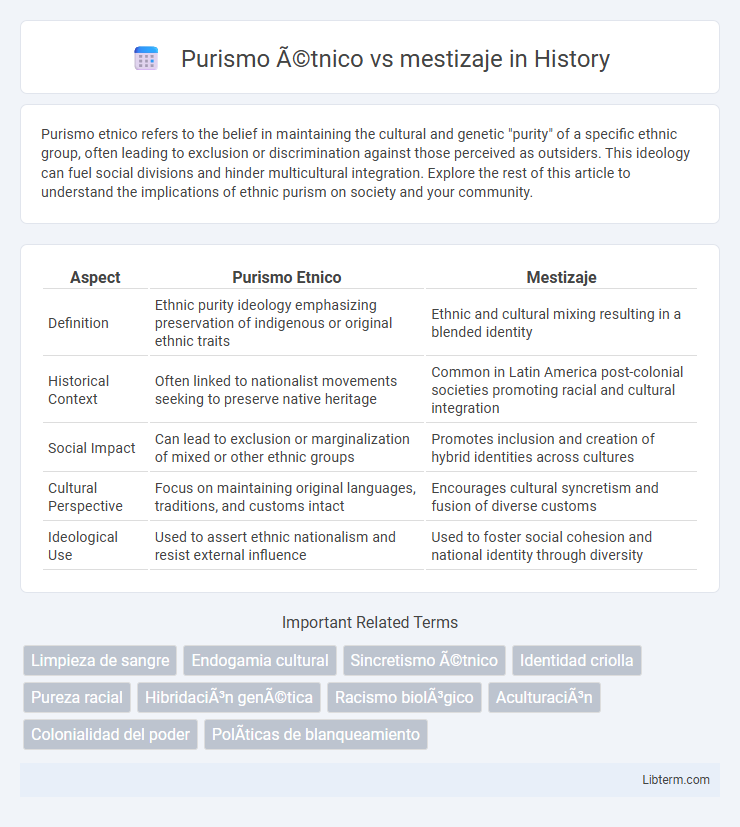Purismo etnico refers to the belief in maintaining the cultural and genetic "purity" of a specific ethnic group, often leading to exclusion or discrimination against those perceived as outsiders. This ideology can fuel social divisions and hinder multicultural integration. Explore the rest of this article to understand the implications of ethnic purism on society and your community.
Table of Comparison
| Aspect | Purismo Etnico | Mestizaje |
|---|---|---|
| Definition | Ethnic purity ideology emphasizing preservation of indigenous or original ethnic traits | Ethnic and cultural mixing resulting in a blended identity |
| Historical Context | Often linked to nationalist movements seeking to preserve native heritage | Common in Latin America post-colonial societies promoting racial and cultural integration |
| Social Impact | Can lead to exclusion or marginalization of mixed or other ethnic groups | Promotes inclusion and creation of hybrid identities across cultures |
| Cultural Perspective | Focus on maintaining original languages, traditions, and customs intact | Encourages cultural syncretism and fusion of diverse customs |
| Ideological Use | Used to assert ethnic nationalism and resist external influence | Used to foster social cohesion and national identity through diversity |
Definición de purismo étnico y mestizaje
Purismo etnico se define como la ideologia que busca preservar la pureza genetica y cultural de un grupo etnico, rechazando la mezcla con otras poblaciones. Mestizaje, en cambio, es el proceso historico y social que implica la mezcla biologica y cultural de diferentes grupos etnicos, especialmente en America Latina, generando identidades hibridas. Esta dicotomia representa tensiones entre la conservacion de identidades etnicas homogeneas y la aceptacion de la diversidad multicultural resultante del mestizaje.
Orígenes históricos de ambos conceptos
Purismo etnico emerged from 19th-century nationalist movements aiming to preserve racial or cultural "purity," often linked to European colonial ideologies. Mestizaje, rooted in Latin American colonial history, denotes the blending of Indigenous, European, and African ancestries forming a unique cultural and genetic identity. Both concepts reflect divergent responses to colonization: purismo etnico emphasizing separation and preservation, mestizaje celebrating cultural fusion and hybridity.
Purismo étnico: fundamentos y argumentos
Purismo etnico se basa en la idea de mantener la pureza cultural y genetica de un grupo etnico, promoviendo la preservacion de tradiciones, idiomas y rasgos ancestrales sin influencia externa. Los defensores argumentan que esta pureza garantiza la identidad colectiva y evita la perdida de patrimonio cultural frente a la homogeneizacion global. Este enfoque rechaza el mestizaje como una amenaza que diluye las caracteristicas distintivas y cohesiona sociedades en una misma matriz cultural.
El mestizaje como proceso social y cultural
El mestizaje como proceso social y cultural representa la interaccion dinamica y continua entre diferentes grupos etnicos, generando identidades hibridas y fomentando la diversidad cultural. A diferencia del purismo etnico, que busca preservar tradiciones y caracteristicas especificas de un grupo sin mezcla, el mestizaje enfatiza la integracion y transformacion mutua de culturas. Este proceso contribuye a la construccion de sociedades plurales, donde las influencias indigenas, europeas y africanas se entrelazan para formar nuevas expresiones culturales y sociales.
Implicaciones políticas y sociales
Purismo etnico often fuels exclusionary nationalism and policies that marginalize mixed-heritage populations, exacerbating social divides and limiting multicultural integration. Mestizaje promotes social cohesion by embracing cultural hybridity and challenging rigid racial hierarchies, fostering inclusive political frameworks and broader representation. The tension between these concepts shapes debates on identity, citizenship, and minority rights across Latin America.
Identidad nacional: exclusión vs inclusión
Purismo etnico emphasizes a homogeneous national identity based on a single ethnic group, often leading to exclusionary policies that marginalize indigenous and mixed populations. Mestizaje promotes inclusion by recognizing and celebrating the blending of diverse ethnic backgrounds as the foundation of national identity. This inclusive approach fosters social cohesion and cultural diversity, challenging exclusionary narratives rooted in ethnic purity.
Purismo étnico en la actualidad
Purismo etnico en la actualidad se centra en la afirmacion y conservacion de identidades culturales y geneticas especificas frente a la homogeneizacion social. Este fenomeno resurge como respuesta a la globalizacion, enfatizando la pureza de linajes y tradiciones autoctonas para preservar la biodiversidad cultural. Movimientos indigenas y comunidades originarias impulsan esta perspectiva para fortalecer su autonomia y resistencia cultural frente al mestizaje dominante.
Mestizaje y construcción de la diversidad
Mestizaje plays a crucial role in the construction of diversity by blending indigenous, European, and African ancestries into a complex social and cultural tapestry. This process challenges the purismo etnico paradigm, which emphasizes ethnic purity and often marginalizes mixed identities. Embracing mestizaje fosters inclusive narratives that recognize hybridity as foundational to national identities and multicultural coexistence.
Desafíos y controversias contemporáneas
Purismo etnico challenges contemporary multicultural societies by advocating for the preservation of distinct ethnic identities, often leading to debates on cultural segregation and exclusion. Mestizaje promotes the blending of diverse cultural and racial heritages, yet faces criticism for potentially erasing indigenous identities and cultural nuances. These tensions create ongoing controversies around identity politics, social integration, and cultural authenticity in Latin America and beyond.
Hacia una convivencia intercultural
Purismo etnico emphasizes the preservation of distinct ethnic identities, often advocating for cultural separation to maintain heritage integrity, whereas mestizaje promotes the blending of different cultures to create a unified national identity. Hacia una convivencia intercultural seeks to balance these perspectives by encouraging mutual respect, dialogue, and recognition of diversity within shared social spaces. This approach fosters inclusion and equity, allowing diverse cultural expressions to coexist productively without erasing individual identities.
Purismo étnico Infographic

 libterm.com
libterm.com